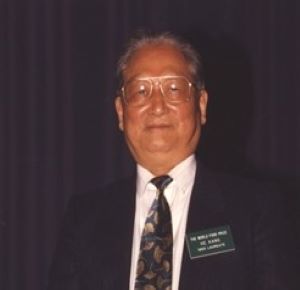
He Kang
China
The 1993 World Food Prize was awarded to He Kang former Minister of Agriculture of the People's Republic of China, for implementing the reform policies that enabled China to become self-sufficient in basic food for the first time in modern history. This major accomplishment – which Minister He was able to achieve in little more than a decade – became all the more impressive when one considers that China, with over one billion people, has 22 percent of the world's population yet only 7 percent of the world’s arable land.
Full Biography
He Kang was born in Hebei in 1923 and graduated from Guangxi University with a degree in agronomy in 1946. He began his government career in 1946 as a manager of an agricultural experimentation station in Nanking. His personal research later developed into the basis for China’s tropical rubber industry, and he continued to manage and direct agricultural and forestry research through the 1950s and 1960s.
Minister He served as deputy commissioner of the State Commission of Agriculture from 1979 to 1982, deputy commissioner of the State Planning Commission from 1982 to 1983, and the Minister of Agriculture from 1983 until 1990. During his tenure in these posts, China went through a major revolution in agricultural science and education and in agricultural production. The Cultural Revolution had left the agricultural universities stripped of equipment, and most faculty had been sent to work in the fields and were out of touch with Western agricultural science. As a member of the Agriculture and Planning Commissions, Minister He was key in mapping out strategies for agricultural reform, which he continued to oversee as Minister.
These reforms caused agricultural output in the early 1980s to grow in excess of eight percent per year. At the same time, rural income more than doubled and poverty in rural areas decreased dramatically. Today, the Chinese are among the most efficient farmers in the world in terms of output per production area. The quality of life in China has been steadily improving – the chronic problem of protein deficiency, for example, has been eradicated – and hunger no longer poses a threat to the general population.
Minister He brought two essential components together for a successful program. First was the revitalization of China's agricultural science and education system. It was through his warm personality and openness that he was able to establish exchanges of scientists and scientific information between China and over 93 countries and regions around the world. Increased international cooperation and exposure were essential to recover the agricultural science and education foundation lost during the Cultural Revolution. Second, and equally important, was the implementation of the family unit of production, which provided an incentive for using new knowledge and technology to increase food and fiber production. This integration of agricultural science and policy simultaneously revitalized family farming while still creating a centralized support system that provided the needed inputs for modern agricultural production.
Subsequently, Minister He supported the growth of rural enterprises to provide economic benefits to rural communities, which helped improve the quality of life in rural areas and encouraged people to remain in rural areas rather than migrate to cities. This was essential as the efficiency of agricultural production was still increasing and rapid urbanization would have destabilized both China’s cities and its nascent rural economy. Eventually, as production reached more optimal levels, urbanization continued at a manageable pace, while rural enterprises maintained themselves, now centered around small towns.
Minister He's programs strengthened and restored agricultural schools and research institutes, established new and specialized research and education centers, and developed new extension mechanisms. The results were easily seen: innovative modern farming technology was quickly developed and applied to improve the quantity and quality of production in agriculture, animal husbandry, and fisheries. His work also improved food quality outside China’s borders, as he directed Chinese expertise and food assistance to African countries through the United Nations and invited over 60 agricultural ministers to Beijing in 1987 for a conference on agriculture in the developing world.
From 1993 to 1998, as a member of the Standing Committee of the National People's Congress, the retired Minister He strove to work on the amendments of the Agricultural Law and other laws related to agriculture. He was persistent in initiating and setting up the Law of Township and Village Enterprises to protect their benefits and ensure their steady developments. He also served as an advisor to the United Nations Food and Agriculture Organization. In 2006, he published the book China’s Township and Village Enterprises in English as its editor-in-chief. Currently he is an advisor to the expert committee of the Chinese Academy of Tropical Agricultural Sciences.
Through Minister He's leadership, China's agriculture has flourished. His contribution in modernizing China's agricultural science and educational system will ensure that China's remarkable agricultural achievements will continue far into the future. Nobel Peace Prize Laureate and World Food Prize founder Dr. Norman Borlaug recognized the vision and leadership of He Kang, adding that "as China's food supply has increased and the basic nutrition of Chinese people has been enriched, He Kang and his colleagues have been able to turn their attention to other vexing problems facing modern agriculture – matters such as environmental concerns and economic development in rural areas. These are issues that concern people in all nations and all of us should attempt to learn from and cooperate with China in its search for solutions to these complex problems."


